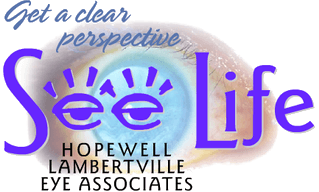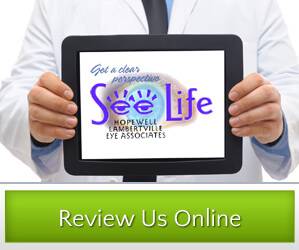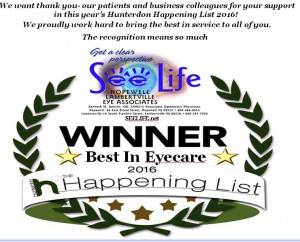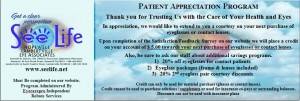Have Questions about eye care? We will answer them
At Hopewell Lambertville Eye Associates in Hopewell, NJ, We want to make sure that you receive all of the information that you need to make educated decisions about your eye health. Our optometrists are always available to answer your questions.
re
Q. How do contact lenses correct vision?
A. To see clearly, light rays need to converge to form a focus point on the retina in your eye. If you are nearsighted, light rays focus in front of the retina, and if you are farsighted, light rays focus behind the retina. Contact lenses correct vision in the same way that glasses do, they focus light on the retina so that you can see images clearly. Because contacts rest directly on the eye, as opposed to glasses, the corrective portion of the lense can be much smaller.
point on the retina in your eye. If you are nearsighted, light rays focus in front of the retina, and if you are farsighted, light rays focus behind the retina. Contact lenses correct vision in the same way that glasses do, they focus light on the retina so that you can see images clearly. Because contacts rest directly on the eye, as opposed to glasses, the corrective portion of the lense can be much smaller.
Q. What are hybrid contact lenses?
A. SynergEyes hybrid contact lenses transform vision for patients with astigmatism, presbyopia and irregular cornea conditions.
Q. What is the best contact lense solution to use for my contacts?
A. I recommend Sauflon All in One Lite No Rub Formula for all of my patients who wear contact lenses. I have seen that the Sauflon formula works best for my patients with sensitive eyes and dry eyes. It provides excellent antimicrobial activity, as well as freedom from patient reactions, helps prevent lenses from drying out by the end of the day, and enhances lens comfort.
Q. What is low vision?
A. Low vision describes describes significant visual impairment that can't be corrected fully with glasses, contact lenses, medication or eye surgery.
Q. How is low vision treated?
A. A low vision specialist can evaluate the degree and type of vision loss you have, prescribe appropriate low vision aids such as lighted handheld magnifiers, digital desktop magnifiers and bioptic telescopes, and help you learn how to use them.
Q. Can vitamins really help my eyesight?
A. Research shows that it is important to make sure you get certain vitamins that are important for eye functions. In particular, it is important as your eyes age to make sure you eat well to protect your eyes from age related illness.
Q. Do you recommend that patients take supplements for eye health? And if so, which patients?
A. All patients can benefit from taking a good quality eye care supplement. I particularly recommend eye supplements to all my patients over 30 years of age.
Q. What is latisse?
A. Latisse is a medication that lengthens, thickens and darkens eyelashes. Latisse both extends the growth phase and increases the number of eyelashes that grow. You apply Latisse by dabbing it with an applicator along your top lash line every night. The drug spreads to your lower lashes automatically when you blink.
Q. What results can I expect from Latisse?
A. After two months of nightly use, you may begin to see results in longer and more lashes. If you stop using Latisse, your eyelashes will gradually return to their former state. After a 16-week study participant experienced a 25% increase in eyelash length, 106% increase in fullness of eyelashes and an 18% increase in eyelash darkness.
Read more
Q: How do allergies directly affect the eyes?
A: Chronic allergies may lead to permanent damage to the tissue of your eye and eyelids. If left untreated, it may even cause scarring of the conjunctiva, the membrane covering the inner eyelid that extends to the whites of the eyes. Ocular allergies can make contact lens wear almost impossible and are among the many causes of contact lens drop-out. Most common allergy medications will tend to dry out the eyes, and relying on nasal sprays containing corticosteroids can increase the pressure inside your eyes, causing other complications such as glaucoma.
Q: What are the common symptoms of OCULAR allergies?
A: Excessive tearing, frequent eye rubbing, constant irritation especially in the corners of your eyes closest to the nose, lid swelling or puffy eyes, and red or pink eyes are some of the most common ocular allergy symptoms.
Q: What is meant by the term allergic conjunctivitis? Is that the same as “pink eye”?
A: Allergic conjunctivitis is the clinical term for inflammation of the lining or membrane of the eye, called the conjunctiva, caused by allergic reactions to substances. Although a patient may present with red or pink eyes from excess inflammation, the common term "pink eye" can signify a broad range of conditions and can be misleading, as viruses, bacteria, fungi, and other irritating substances can cause redness resembling a "pink eye." Your eye doctor can differentiate between an allergy and a true infection, which can lead to faster healing with the right treatment.




